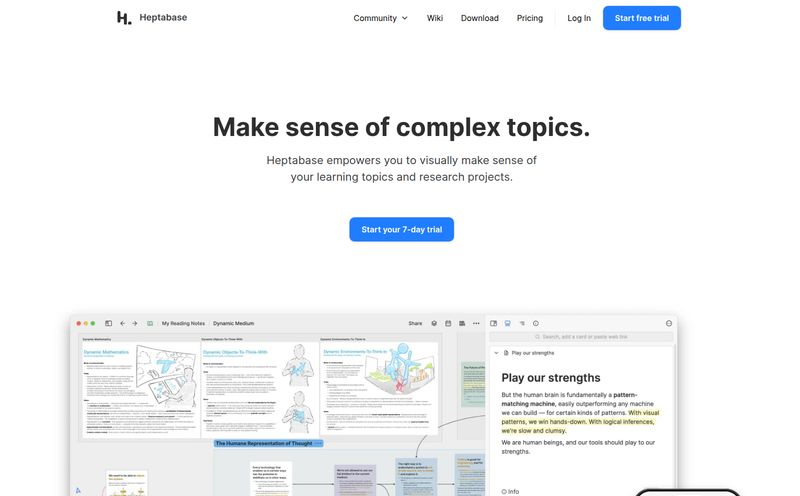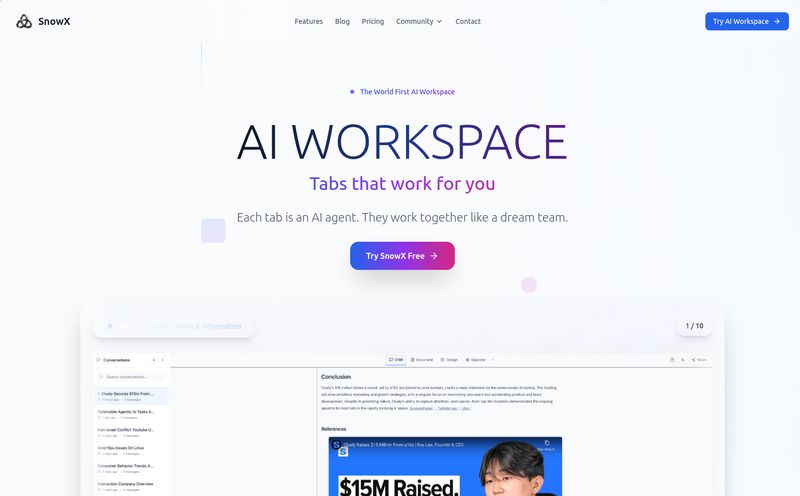As someone who’s been navigating the wild waters of SEO and digital trends for years, I've seen my fair share of promising tools pop up and, well, disappear. It’s the circle of life in the tech world. But every now and then, one comes along that really makes you lean in, one that promises to solve a truly monstrous problem. For academics, researchers, and anyone who’s ever stared at a blank page with a thesis deadline looming, WeGuru was supposed to be that tool.
It arrived on the scene with a bold claim: an AI-driven assistant that could handle the entire academic drafting process. Not just grammar checks or citation formatting. We're talking the whole shebang. And then… poof. It became a digital ghost. So let’s put on our detective hats and talk about the promise, the mystery, and the important lesson of WeGuru.
What Was WeGuru Supposed to Be?
Imagine an assistant that doesn't need coffee breaks. One that can read hundreds of research papers before you’ve had your first cup of tea. That was the dream of WeGuru. It wasn’t positioned as just another writing aid; it was marketed as a full-blown research partner. Its goal was to automate the most grueling parts of academic work, the stuff that makes even the most passionate PhD candidates question their life choices.
It was designed to be a powerhouse for both qualitative and quantitative analysis, which is a pretty ambitious combination. Most tools pick a lane. WeGuru wanted the whole highway. From what I gathered, it aimed to streamline the entire journey from a raw idea to a polished, nearly-complete paper.
The Killer Features That Caught My Eye
Let's be real, the feature list was tantalizing. It read like a wish list for every grad student on the planet.
First up was automating the literature review. Anyone who's done one knows this isn't just reading. It's a soul-crushing expedition into a jungle of jargon, conflicting studies, and endless PDFs. The idea of an AI that could hack through that jungle, identify key themes, and synthesize them into a coherent review? That’s not just a time-saver; it’s a sanity-saver. It's like having a sherpa for the Mount Everest of academic writing.
Then there was the quantitative muscle with custom R code generation. For many researchers, statistical analysis is a foreign language. R is a powerful one, but with a steep learning curve. WeGuru promised to be a universal translator. You'd bring the data, and it would not only perform advanced analysis but also spit out the very R code used to do it. This was huge—it offered transparency and a learning opportunity, not just a black-box answer.
And the grand finale: a ready-to-submit paper. This was the feature that raised both eyebrows and heart rates. The platform claimed it could integrate the literature review, the data analysis, and the generated code into a cohesive, structured academic paper. The ultimate carrot on a stick for anyone drowning in research.
Okay, So Where Did It Go? The 404 Mystery
This all sounds amazing, right? So, naturally, I went to check it out. I wanted to see the interface, look for a demo, maybe find some user testimonials. And what did I find?

Visit WeGuru
A big, fat 404 Not Found. The digital equivalent of a vacant lot where a skyscraper was supposed to be. I dug a bit deeper. The information I could find mentioned their Calendly page for booking demos was also unavailable. It's not just a broken link; the entire online presence seems to have evaporated.
What does this mean? In the startup ecosystem, this usually points to one of a few things. Perhaps the project ran out of funding—a common story. Maybe the technology was more difficult to perfect than anticipated (that "ready-to-submit paper" feature sounds incredibly complex). It's also possible the team pivoted to a different project or was quietly acquired. We may never know for sure, but it stands as a classic example of the volatility of cutting-edge tech. One day you’re the next big thing, the next you're a 404 error page. A real shame, too.
The Reality Check for AI in Academic Research
The story of WeGuru, this promising ghost, is a perfect launching point for a more honest conversation about AI's role in the world of research. It's not all magic and automated solutions.
The "Ready-to-Submit" Illusion
Even in the information about WeGuru, a crucial caveat was tucked away: it
Requires user review before submission.
And thank goodness for that. The idea that an AI, no matter how advanced, can produce a paper fit for submission without intense human oversight is, frankly, a fantasy. Academic writing isn’t just about stringing sentences and data points together. It’s about critical thinking, novel argumentation, and a deep, nuanced understanding of a field. An AI can mimic structure, but it can’t (yet) replicate true intellectual contribution. It can't debate itself or question its own sources with the skepticism of a seasoned academic. This is why tools from giants like Google and standalone platforms like Grammarly or QuillBot focus on assisting, not replacing, the writer.
The Double-Edged Sword of Automation
The second point in the 'cons' list was that it
May not fully replace the need for manual work in all cases.
This is the most honest statement of them all. AI tools are incredible for handling grunt work. They can analyze massive datasets in seconds, spot patterns humans might miss, and organize information beautifully. But research is also about the journey. It's the struggle with a difficult concept that leads to a breakthrough. It's the manual, painstaking process of coding qualitative data that reveals subtle insights. Over-reliance on automation risks creating a generation of researchers who know how to get an answer from a machine but not how they got there. It can smooth the path so much that you miss the scenery.
What This Means for You, the Researcher
So what's the takeaway? Don't be disheartened. The dream of a powerful AI research assistant is still very much alive. But we have to be smart consumers. Don't put all your faith in a single, shiny new tool, especially one that appears to be… well, a ghost. Diversify your digital toolkit. Use established platforms. Most importantly, view AI as a collaborator, not a replacement for your own brain. It’s a powerful intern, not the tenured professor.
Frequently Asked Questions about WeGuru and AI Writing
- What exactly was WeGuru?
- WeGuru was pitched as an all-in-one AI platform designed to help academics and researchers. It promised to automate literature reviews, perform complex data analysis with R, and generate a draft of a full academic paper.
- Why can't I access the WeGuru website?
- Currently, the WeGuru website is showing a 404 error, indicating it's not live. The reasons are unknown, but this often happens with tech startups due to issues like funding, technical challenges, or a change in business direction. It has effectively become a 'ghost' platform.
- Could WeGuru really write a full academic paper?
- It claimed to generate a cohesive, ready-to-submit paper, but this always came with the fine print that user review was necessary. Realistically, no AI today can replicate the critical thinking and original insight required for a truly submittable academic work without significant human intervention.
- Are there any good alternatives to WeGuru?
- Yes, while no single tool does everything WeGuru promised, you can build a powerful workflow with other tools. Consider platforms like ResearchRabbit or Connected Papers for literature discovery, and established writing assistants for polishing your prose.
- Is it ethical to use AI for academic writing?
- This is a hot topic. Most universities, like those cited in a study by Nature, agree that using AI for brainstorming, summarizing, or improving clarity is generally acceptable. However, passing off AI-generated text as your own original work is considered plagiarism. Always check your institution's specific guidelines.
- What happened to WeGuru's pricing?
- There was never any public pricing information available for WeGuru. Both the pricing data and the link to a pricing page were empty, which was another sign the platform may have been in a very early, pre-launch stage before it disappeared.
A Final Thought on Digital Ghosts and AI Dreams
The story of WeGuru is a bit of a bummer, but it's also a fantastic lesson. It reminds us to maintain a healthy dose of skepticism amidst the AI hype. For every tool that changes the world, there are a dozen digital ghosts haunting the servers of the internet, whispering tales of what could have been. The promise of AI in research is immense, but its progress won't be a straight line. It will be a messy, human process of trial, error, and the occasional 404 page. And maybe that's for the best. It keeps us on our toes.
Reference and Sources
- Grammarly: https://www.grammarly.com/
- QuillBot: https://quillbot.com/
- ResearchRabbit: https://www.researchrabbit.ai/
- Connected Papers: https://www.connectedpapers.com/
- Nature article on AI ethics in academia: https://www.nature.com/articles/d41586-023-00502-8



